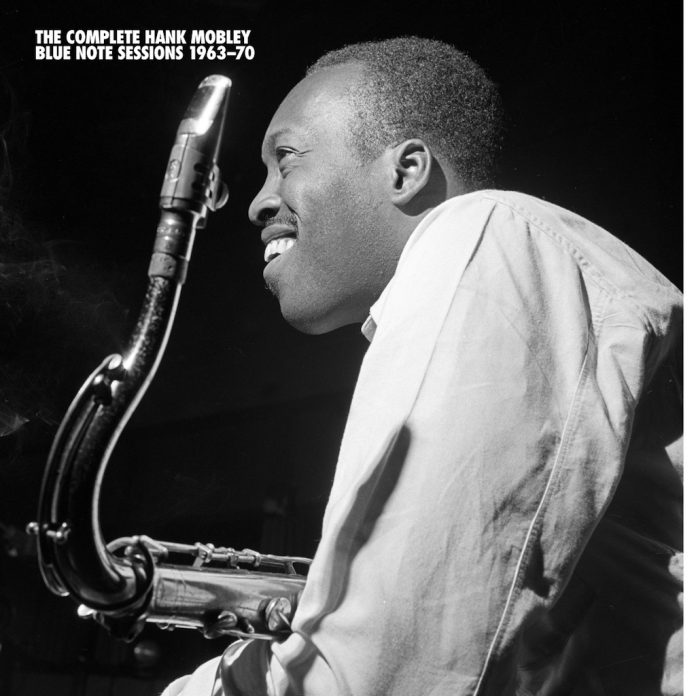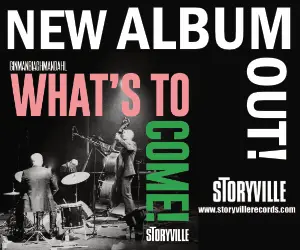This comprehensive eight-disc set covers Mobley’s last great period as a Blue Note leader on records. It follows on from Mosaic’s previous six-disc set of complete 1950s sessions (MD6-181), now out of print. Dealing as it does with 1963-70, it doesn’t include the three masterworks, generally considered to be Hank’s best three – Soul Station, Roll Call and Workout, 1960-61 – which would have had to start any full 1960s Mobley retrospective. But there’s plenty of superb stuff here.
The collection begins with six tracks that eventually were issued on a Music Matters LP as The Feeling’s Good. Two tracks were previously issued as part of Mobley’s No Room For Squares, which is presented here in full, including alternate takes. No Room is thought of as one of Hank’s best sets, comparable favourably to the 1960-61 masterworks. Hank’s sound had become firmer and stronger since 1960 and he was obviously in his element with rhythm players like Herbie Hancock, Butch Warren and his old friend Philly Joe Jones. Mobley charges joyfully through No Room with Philly Joe whisking up a rhythmic storm behind him and there is a touch of soul blues on Up A Step. Lee Morgan’s Carolyn is a typical melancholy ballad from the trumpeter on which both he and Mobley exercise their ballad playing skills fruitfully. Donald Byrd and Morgan share the trumpet duties on 15 tracks, including alternate takes and it is good to hear these two albums in full and not as the bits and pieces Blue Note put out in originally. Morgan is all fire and brimstone on his featured tracks and with his inventive twists and turns he was probably Mobley’s ideal front-line partner. At any rate he appears on six of Mobley’s 1960s records.
CD2 begins with three alternate takes from the No Room For Squares session followed by the six pieces that made up the album The Turnaround. Freddie Hubbard comes in on trumpet and Billy Higgins on drums. The title track is a soulful tune – something that Blue Note required of all their leaders after the huge success of Lee Morgan’s The Sidewinder. This is an attractive session with all Mobley compositions including a new version of his ballad My Sin which he first recorded in 1955.
CD3 gives us Dippin’, a more relaxed Mobley set with a ballad, a bossa nova and, of course, the obligatory soul blues. Morgan was back on trumpet for Dippin’ as he would be on the next four Mobley sessions. Two pieces on CD3 and four on CD4 give us A Caddy For Daddy, one of Hank’s liveliest and most sparkling sessions. With Curtis Fuller on trombone and McCoy Tyner on piano, Hank seems inspired to play some of his brightest solos and everybody is on good form. So they are too on the rest of CD4 which gives us the set A Slice Of The Top, an ambitious project where Mobley had euphonium, flute, tuba and alto added to his combo and produced brisk music, somewhat like an update on the sound of Miles Davis’s Birth Of The Cool nonet. It was arranged by Duke Pearson, the tuba parts adding a warm glow to the ensembles, and Hank plays some of his strongest solos to date. It is reported that he was angry that this LP was not issued until 1979 as he considered it some of his best work. The three tracks on CD5, from the Straight No Filter session, could be subtitled Hank’s Very Hard Bop Record. True, most of the high-octane energy comes from Morgan and Higgins, but the set positively burns. These three pieces were meant as part of a new LP that was never completed – another annoyance for Hank – although they did turn up eventually as part of the CD of the same name in 1986. The rest of CD5 has the Third Season LP which also featured James Spaulding on alto and flute, Sonny Greenwich on guitar as well as Morgan and Higgins again.
CD6 has the Far Away Lands record that sounds like a throwback to Hank during his classic 1960-61 period. He is very relaxed again here with his tenor flowing naturally out of the ensembles and coasting along on a fine rhythm section comprising Cedar Walton, Ron Carter and Higgins. It was, in fact, his last recording with a five-piece Jazz Messengers style set up and his last with his colleague from way back, Donald Byrd. The soul-type blues Soul Time is a goodie, but all tracks are superior hard bop in a laid-back manner. It came to represent more frustration for Mobley though, not seeing daylight until 1985. The rest of CD6 comprises the High Voltage set from 1967 with Blue Mitchell on trumpet and Jackie McLean adding alto to Hank’s tenor sax in the front line. Again it is a superior recording with inventive, freely flowing solos from Hank and it makes you wonder how he managed to be so consistently good on each recording. This in turn calls into question his lack of recognition generally and the decisions not to issue so much of his work at the time of recording.
CD7 has the full Reach Out recording and is Hank’s least attractive set in a collection of first-rate albums. With the title track and Goin’ Out Of My Head obviously courting the pop market you can tell Hank is not happy. Booklet annotator Bob Blumenthal says Woody Shaw is playing flugelhorn on Good Pickin’s but my speakers say trumpet. A lot of the solo space goes to George Benson and he is in his element. Good Pickin’s is the best piece and Hank’s solo here is more adventurous but overall it is far from his considerable best. Tracks 7-11 contain The Flip, a dynamite disc from 1969 recorded in Paris by arrangements made by Francis Wolff of Blue Note. Mobley is back in highly inventive mode, his solos firm but flowing freely again and helped considerably by old running pal Philly Joe Jones who is terrific. His impeccable time and nourishing fills and accents propel this music along joyously. Late on in the careers of Hank and Philly Joe the music sizzles with invention from first to last and is one of Hank’s very best. Early Morning Stroll cruises along smoothly, Hank fitting phrases in easily as he is spurred on by Philly. Hank strolls along happily, inserting a quote from March Of The Siamese Children and this composition closes a clearly inspired recording session.
CD8 wraps it up with Thinking Of Home, Hank’s final album for Blue Note and almost his last LP. It was recorded in 1970 and was very good, with Hank producing more of a big sound than a “round” one, as he used to describe it. It still had plenty of fire, blues and warmth in it though and by this time his overall sound was firm and very strong. He solos well, as does Woody Shaw, clearly happier than on the funky Reach Out disc. This combo, with a bright rhythm section comprising Cedar Walton, Mickey Bass and Leroy Williams, might have made a great Mobley touring band if he had tried to put one together; life could have been very different. As it was, the final 16 years were a downward slope culminating in Mobley sleeping rough in a railway station in Philadelphia and approaching a bandleader and saying “I used to be a musician”. His five unissued LPs were finally released between 1979-1986 but it was too late for Hank, who died in 1986, to get much benefit.
Discography
CD1: Up A Step; Old World, New Imports; East Of The Village; The Feelin’s Good; Yes Indeed; Three Way Split; Carolyn; No Room For Squares; Me ‘N You; Comin’ Back; Syrup And Biscuits (76.26)
CD2: Me ‘N You; Carolyn; No Room For Squares; The Turnaround; Straight Ahead; My Sin; Pat ‘N Chat; Third Time Around; Hank’s Waltz (62.09)
CD3: The Dip; Recado Bossa Nova; The Breakthrough; The Vamp; I See Your Face Before Me; Ballin’; A Caddy For Daddy; The Morning After (61.13)
CD4: Venus De Mildew; Ace Deuce Trey; Third Time Around; Hank’s Other Bag; There’s A Lull In My Life; A Slice Of The Top; Cute ‘N Pretty; A Touch Of Blue (59.28)
CD5: Straight No Filter; Chain Reaction; Soft Impressions; An Aperitif; Don’t Cry, Just Sigh; The Steppin’ Stone; Third Season; Boss Bossa; Give Me That Feelin’; Don’t Cry, Just Sigh (64.18)
CD6: A Dab Of This And That; Far Away Lands; No Argument; The Hippity Hop; Bossa For Baby; Soul Time; High Voltage; Two And One; No More Goodbyes; Advance Notice; Bossa Deluxe; Flirty Gerty (75.58)
CD7: Reach Out; Up, Over And Out; Lookin’ East; Goin’ Out Of My Head; Good Pickin’s; Beverly; The Flip; Feelin’ Folksy; Snappin’ Out; 18th Hole; Early Morning stroll (74.59)
CD8: Suite: Thinking Of Home; The Flight; Home At Last; Justine; You Gotta Hit It; Gayle’s Groove; Talk About Gittin’ It (42.43)
Mobley (ts) with, collectively: Donald Byrd, Lee Morgan, Freddie Hubbard, Blue Mitchell, Dizzy Reece, Woody Shaw (t); James Spaulding (as, f); Jackie McLean (as); Kiane Zawadi (tb, euph); Howard Johnson (bb); George Benson, Eddie Diehl, Sonny Greenwich (elg); Lamont Johnson, Vince Benedetti, Barry Harris, Andrew Hill, Herbie Hancock, Harold Mabern, McCoy Tyner, Cedar Walton, John Hicks (p); Butch Warren, John Ore, Paul Chambers, Walter Booker, Bob Cranshaw, Larry Ridley, Ron Carter, Alby Cullaz, Mickey Bass (b); Philly Joe Jones, Billy Higgins, Leroy Williams (d). New Jersey, USA & Paris, 7 March 1963 – 31 July 1970.
Mosaic MD8-268
Derek Ansell’s book on Mobley, Workout, is available as an e-book from Northway Publications, London
















